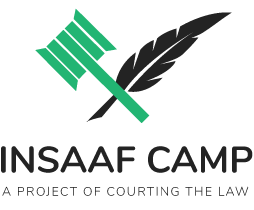CTL Insaaf Camp
Courting The Law (CTL) is a Pakistan focused multi-dimensional law and justice initiative which has evolved over the years and now has many projects under its umbrella. With an aim to improve the legal system of Pakistan, each project is focused on tackling various challenges faced by the legal system today. One of them is Insaaf Camp, CTL’s answer to the problems of legal illiteracy and lack of access to justice for the underserved segments of Pakistan’s society.
The concept of Insaaf Camp was developed by prominent lawyer and CTL’s Founder, Barrister Taimur Malik, in consulatation with Mr. Farhan Shafi, a young law student from Lahore. The objective was simple – to see Pakistan with a legally empowered society and help communities having minimal access to legal information and legal support across Pakistan. The initiative is managed by the CTL team with mentorship and guidance provided by Barrister Taimur Malik.
Insaaf Camp has developed a diverse strategy to achieve its aims.
- Firstly, it includes conducting legal awareness camps and legal aid camps in underprivileged areas across Pakistan. The focus is to provide legal guidance and support to those communities who are unaware of their rights. One such camp was conducted in Lahore with the collaboration of a partner organization, NAYMET, which was attended by over 100 people, predominantly female.
- Another initiative is to hold legal awareness sessions at educational and vocational institutes across Pakistan. Insaaf Camp’s team member, Barrister Maryam Hayat, recently delivered a session on family laws and women’s rights at Rah-e-Mashal’s premises.
- Another part of the devised strategy is to create and spread brochures and leaflets on common legal issues faced by underprivileged communities – bringing legal information to their doorsteps.
Insaaf Camp’s next major milestone will be the Insaaf Helpline, set to be launched this summer. The helpline will be open for anyone in Pakistan to call and have their legal queries addressed for free. Other than providing legal guidance as much as possible, Insaaf Camp will also partner up with lawyers and law firms willing to take on cases on a pro bono basis (free of charge) on behalf of those who are genuinely aggrieved and require legal support. The helpline will provide guidance on all areas of law.
Insaaf Camp’s future vision is to cultivate and develop a culture of pro bono legal services in Pakistan. It has already partnered up with lawyers and law firms in this regard and continues to expand its network beyond the volunteer lawyers already on board from across Pakistan. In a recent noteworthy example, Insaaf Camp, in collaboration with partner firm KILAM Law, successfully represented a visually impaired lawyer on a pro bono basis at the Lahore High Court.
Another aim is to reduce the burden on courts by promoting alternative dispute resolution (ADR) mechanisms among the general public, such as filing complaints with the Office of the Federal, Provincial and other Mohtasib (Ombudspersons) and through mediation.
A unique aspect of the Insaaf Camp is that it is part of a greater movement to improve the legal system of Pakistan, thus it benefits from being in the close proximity of other CTL projects, including the Vakeel platform developed by CTL which is an ever-growing network of lawyers willing to work on a pro bono basis; the Mohtasib platform which helps assess a complainant’s eligibility and file her or his complaint free of charge with the relevant ombudsperson’s office in Pakistan; the linkage with CTL’s Q&A App which allows people to submit legal queries for free and receive responses from some fo the best lawyers in the country; a growing list of volunteers from the National Law Scholars program; and CTL sponsorships and partnerships with law schools across the country, to name a few. These continue to help Insaaf Camp evolve at a rapid pace.
While there is a great need for initiatives that enhance access to justice and improve legal literacy in Pakistan, there are not many that exist today. A few notable initiatives, however, been working hard in this area, including the following:
- The Legal Aid Society, a not-for-profit organization has been working since 2013 under the chairpersonship of Justice (R) Nasir Aslam Zahid (Former Judge, Supreme Court of Pakistan). Its efforts are focused upon providing pro bono/low bono legal aid services to enhance access to justice to underserved, marginalized and disempowered segments of the society, specifically women, religious minorities and juveniles. It operates a legal advisory call-centre, has capacity building programs and conducts legal awareness clinics and pro bono advocacy campaigns. The initiative mainly focuses on Sindh.
- The Society for the Protection of the Rights of the Child (SPARC), a partner organization of Insaaf Camp, is a non-governmental organization dedicated to protecting the rights of children. It has been working since 1992. It runs centres for street children, conducts trainings and undertakes various other projects to achieve its aims. It also undertakes research in the area of child rights and prepares publications.
- The Digital Rights Foundation, a partner organization of Insaaf Camp, is working on making cyberspace safe for women. It has established a helpline to provide free consultation and assistance to callers against online harassment through a qualified support team. It also conducts workshops to create awareness about digital rights.
- Another initiative, Qaaf se Qanoon, launched by SZABIST’s law school faculty, alumni and students has been involved in educating people on their rights since 2015. It has taken on cases on a pro bono basis, engages in research and has conducted a radio show for legal awareness in the past.
Pakistan, today with a population of more than 210 million people, needs many more initiatives, lawyers and firms committed to working towards improving access to justice and enhancing legal literacy. With more efforts, it is not impossible to achieve a society that is legally empowered.



Good initiative. Interested indeed.